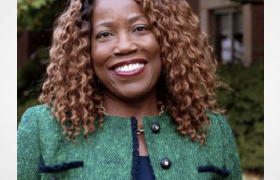Marcilynn Burke, the current dean of law and Dave Frohnmayer Chair in Leadership and Law at the University of Oregon and former acting assistant secretary for the U.S. Department of the Interior, has been named dean of Tulane University School of Law, effective August 5.
Tulane President Michael A. Fitts and Senior Vice President for Academic Affairs and Provost Robin Forman announced the appointment in a university-wide message today. The announcement lauded Burke’s achievements, noting that her “long service and expertise in academia, private practice and government service set her apart from the list of remarkable candidates identified through our national search.”
“I am inspired by Tulane Law’s commitment to public service, impactful scholarship, and exceptional teaching.”
Marcilynn Burke, Dean of Tulane Law School
Burke said that she was “thrilled to serve” as the next leader of Tulane Law School.
“The law school’s rich traditions of academic excellence, commitment to justice and global perspectives are ones that I have admired since I joined the legal academy over 20 years ago,” Burke said. “I am inspired by Tulane Law’s commitment to public service, impactful scholarship, and exceptional teaching. I am eager to work alongside the law school’s distinguished faculty, dedicated staff, talented students, and committed alumni to continue shaping the future of legal education and the legal profession.”
Burke specializes in property, land use and environmental and natural resources law – as well as other areas that are strategic priorities for Tulane’s law school. She has published extensively in leading law reviews. Burke earned her bachelor’s degree from the University of North Carolina at Chapel Hill, where she was a member of Phi Beta Kappa. She earned her juris doctorate from Yale Law School, where she was an editor of both the Yale Journal of International Law and the Yale Journal of Law and Feminism.
After law school, Burke clerked for the Honorable Raymond A. Jackson of the Eastern District of Virginia and later joined the law firm of Cleary, Gottlieb, Steen & Hamilton, where her practice focused on environmental law, antitrust and civil and criminal litigation. She also served as a visiting professor at Rutgers School of Law in 2001.
In 2002, Burke joined the law faculty at the University of Houston. From 2009 to 2013, she served in the U.S. Department of the Interior. Initially she was deputy director for programs and policy for the Bureau of Land Management (BLM) and then was appointed acting assistant secretary for land and minerals management for the Department by President Barack Obama. In the latter role, she helped develop the land use, resource management and regulatory oversight policies administered by the BLM, the Bureau of Ocean Energy Management, the Bureau of Safety and Environmental Enforcement and the Office of Surface Mining Reclamation and Enforcement.
Following her term at the Department of the Interior, Burke returned to the University of Houston Law Center as an associate professor of law and later served as associate dean. Known for her engaging personality and rapport with students and colleagues alike, she was named professor of the year by the Law Center’s Black Law Students Association. In 2017 she was appointed dean of the University of Oregon’s law school, where she has been hailed as an ambitious, focused and strategic leader. She also currently serves as the chair of the board of trustees for the Law School Admission Council.
During her tenure at Oregon, Burke increased fundraising and strengthened ties with alumni, which supported expansion of areas of excellence in business law and experiential learning. She grew the enrollment and recruited and retained distinguished faculty and staff members, positioning the school on a path of financial sustainability and academic excellence. She also enhanced student support, leading to improved bar passage rates and job placement success.
Sally Richardson, the A.D. Freeman Professor of Civil Law at Tulane who has served as interim law dean since May, will continue in that role as the law school transitions to new leadership.





